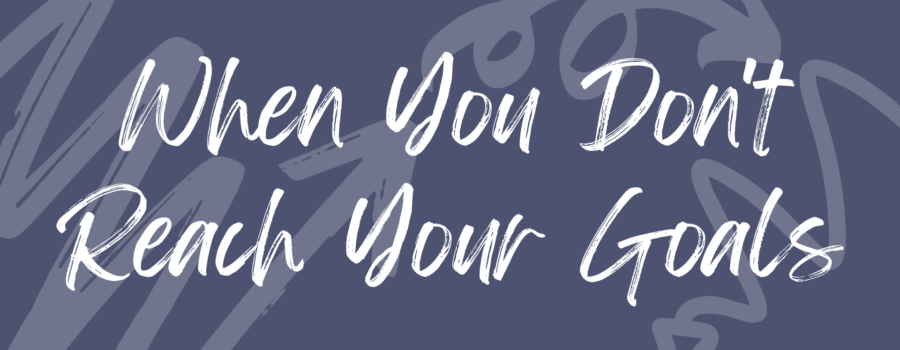Goal-setting is a great practice. It is empowering, hopeful, and even exciting. We see this thing ahead of us, something we want to accomplish, some way we want to be, or what we want to be true. We see it and choose to believe at some level we can reach that goal, and we begin taking small steps to achieve it.
To some degree, progress isn’t possible without having some goals or intentions, to have in mind where we want to go, how we want to live, or what God is asking of us. We will remain in the same place if we never choose to see beyond this moment, to what could be.
But if you’re a human like me, you probably have tried to set goals, maybe even resolutions for this new year, and it’s week 2 and you’ve already messed it up. You wanted to exercise five times a week, and last week you only did it twice. You wanted to be more patient with your friends, and yesterday you reacted too quickly. You wanted to be wise with your money but you already saw these shoes you just couldn’t pass up. You wanted to eat healthier, but that chocolate chip cookie wasn’t going to eat itself.
You made goals, and you already screwed it up.
That must mean you are screw up, too.
Right?
That you can’t get anything right, you’ll never measure up, and always be a failure.
Yikes. I know I just hit something deep for some of you.
You are trying to be better, to do better, and then one mistake or one moment of disappointing yourself or someone else feels like a defining moment. You get mad at yourself, judge and shame yourself for not ever being able to reach your goals.
I don’t think you need me to tell you how unkind that is. You hear it.
It’s easy to look at the people in the lanes around you, too. You see how fast they are going, how much progress they are making, and feel behind. But author and podcaster Emily P. Freeman says, “Your pace is your pace. There is no such thing as behind.”
It’s easy to shame ourselves when we don’t live up to our expectations, when we don’t reach our goals. But what if we approached goal-setting and goal-achieving with more grace and compassion?
What if we saw our goals as more of a target instead of a bullseye? What if it’s okay to hit around the bullseye instead of always hitting the exact mark? What if it’s okay to do this imperfectly? To keep taking one step at a time, no matter how slow or fast we move, and even when we take a step back.
To exercise two times instead of five and celebrate the progress instead of seeing the failure.
To apologize to your friend and try to be more patient next time.
To allow yourself a cookie every once in a while.
To stop calling yourself all kinds of mean names.
To learn from those shortcomings, make adjustments if needed to those goals and expectations, and try again.
To not make excuses in your grace for yourself, but to simply acknowledge you are human, and it’s okay.
We don’t have to be perfect. We can’t be. And we can’t reach our goals in some perfect, linear way either.
And though that feels disappointing, and it’s okay to acknowledge that, it’s important to give ourselves more grace in the process.
Because isn’t that the way of Jesus?
Keep your goals as a target in front of you, and just do the best you can to hit it. If you don’t, pick up the arrow and try again.
What are your goals for 2022? Or even for the first few months of 2022?
Are those goals realistic for your season of life?
Are those goals turning into unhealthy expectations?
When you don’t reach a goal as you had hoped, how do you react?
How can you practice giving yourself grace instead of shaming yourself when you don’t reach your goal?
Do you need to adjust any expectations or goals?
What small steps can you take now to work toward progress?
I hope you know you will not do this perfectly, this whole goal-setting thing. You won’t. I hope you’ll accept that as truth and allow yourself room to have some growing pains as you move toward where you want to be. Let’s do what we can with what we have and stop expecting ourselves to be superhumans.






Recent Comments